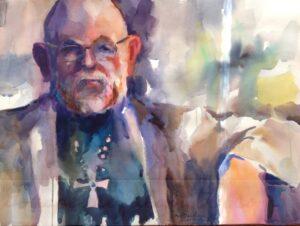Understanding the Grace of God
Introduction
For it is by grace you have been saved, through faith—and this is not from yourselves, it is the gift of God— 9 not by works, so that no one can boast. Ephesians 2:8-9
One of the most recent high profile examples of the Grace of God touching someone’s life was shared across the YouTube world. It was Oliver Anthony’s testimony on the Joe Rogan podcast, (https://www.youtube.com/watch?v=YbBXRSPBD2E). He tells how he was at his lowest point when he was overcome by the unconditional love of God. The world watched as his humble life was transformed into worldwide fame. So far he has been able to resist the temptations of that popularity. He has continued to boldly though gently share his faith.
What is the Grace of God?
Some preachers like to use the word as an acrostic. God’s Riches At Christ’s Expense! This points to the specific events of Jesus’ life, death, and Resurrection. As Paul says in 2 Corinthians 5:21
God made him who had no sin become sin for us that we might become the righteousness of God.
More simply stated Grace is a free unearned gift. From a Christian perspective this means the love, forgiveness, and providence of God is given to us without any merit on our part.
A more recent very dramatic event has been seen by many as the Grace of God. I am speaking of the near miss of an assassin’s bullet aimed at President Trump.
Grace Changes lives
My own testimony is an example of a life changed by Grace. After the untimely death of my father at age 52 I gradually became depressed and lost my faith. 6 years later as my decent into atheist reached bottom I cried out to the bathroom mirror. Literally naked and emotionally bare I said, “Can’t I just be be?” The voice of God responded “Yes, and I am!”
In less than a week I found myself talking with Bishop Alex Stuart of the Episcopal diocese of Western Massachusetts. He said my life reminded him of Saul who became Paul on the road to Damascus.
Grace is free but not cheap.
Dietrich Bonhoeffer drew a distinction of Grace versus Cheap Grace. He demonstrated this with his life fighting Hitler and the Nazis during WWII. When we receive the Grace of God’s love we are called to respond with a righteous life. Not that this is a payment. It is rather the cost of full acceptance of a life directed by that love and passed on to others.
My Bishop Jones of Selma explains righteousness. He says it is more a state of being that a series of behaviors. Yet the way of being leads us to act as Jesus would act. Paul calls it the fruit of the Spirit in his letter to the Galatian church: love, joy, peace, patience, kindness, goodness, faithfulness , and self control.
We are called to extend the Grace of God
Being people of Grace is an important extension of being receivers of Grace. There is a line from a children’s song “Love isn’t love till you give it away, give it away, give it away. Love isn’t love till you give it away and you keep on getting more.”
It is like the old hymn, Freely, Freely
God forgave my sin in Jesus’ name,
I’ve been born again in Jesus’ name;
And in Jesus’ name I come to you
To share His love as He told me to.
Chorus
He said: ‘Freely, freely, you have received,
Freely, freely give;
Go in My name, and because you believe
Others will know that I live.’
Pay it Forward
We can emphasize this freely give notion with the example of the Movie, Pay it Forward.
(https://en.wikipedia.org/wiki/Pay_It_Forward_(film)).
“Trevor McKinney begins the seventh grade in Las Vegas. His social studies teacher, Eugene Simonet, assigns the class to put into action a plan that will change the world for the better. Trevor calls his plan “pay it forward”, which means the recipient of a favor does a favor for three others rather than paying it back. However, it needs to be a favor that the recipient cannot complete themselves. Trevor implements the plan himself, forming a branch of good deeds.”
Although there are no explicit references to Jesus or Christianity, Trevor is a Christ figure who gives everything by dying at the hands of bullies. His plan is not cheap grace, it is difficult.
Conclusion
Grace is commonly used yet not always carefully comprehended. For Christians it is for mostly connected to the willing sacrificial love of Jesus. Then, as shared above, it is the intervention of God’s love transforming our lives. All of it unearned and undeserved. Moreover, it comes with the invitation to pay it forward to others.
For more posts click here.
